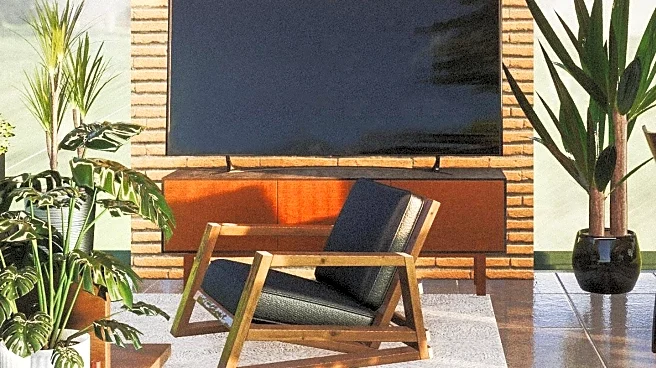What's Happening?
Tyler Piña, a screenwriter and Emmy Award-winning director, has realized his dream of living in a Midcentury Modern penthouse in West Hollywood, Los Angeles. The apartment, designed by architect Edward H. Fickett and built in 1952, is located near the Sunset Strip and features a unique indoor-outdoor floor plan with a lanai, vaulted ceilings, and extensive glasswork. Piña moved into the 2,850-square-foot unit during the COVID-19 pandemic after a series of price reductions made it affordable. The apartment includes a living room with a bar, a formal dining room, an updated kitchen, and ample storage space. Piña has decorated the space with Midcentury-inspired furniture and local artworks, expressing his creativity through interior design.
Why It's Important?
The story highlights the appeal and cultural significance of Midcentury Modern architecture in Los Angeles, a style that continues to attract creatives and professionals seeking unique living spaces. Piña's experience underscores the challenges and opportunities in the rental market, particularly in high-demand areas like West Hollywood. His ability to secure a desirable apartment during the pandemic reflects broader trends in real estate, where market fluctuations can create opportunities for renters. Additionally, Piña's approach to decorating and furnishing his home emphasizes sustainable practices, such as purchasing second-hand items, which align with growing consumer interest in eco-friendly living.
What's Next?
Piña has decided to move out of the apartment following his roommate's departure, opting to travel to Europe and Asia while working remotely. He plans to continue using platforms like Facebook Marketplace to furnish his next home, valuing the personal stories and cost-effectiveness of second-hand items. This decision marks a new chapter in his life, as he seeks inspiration and experiences abroad, potentially influencing his future creative projects.
Beyond the Headlines
Piña's story reflects broader cultural shifts towards valuing experiences and memories over material possessions. His decision to sell and donate his furniture before traveling highlights a minimalist lifestyle trend, where individuals prioritize flexibility and mobility. This approach resonates with younger generations who often seek meaningful experiences and connections rather than accumulating physical belongings.










